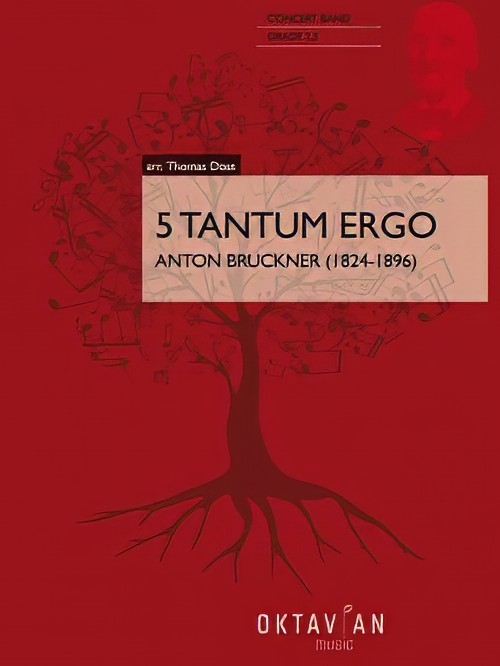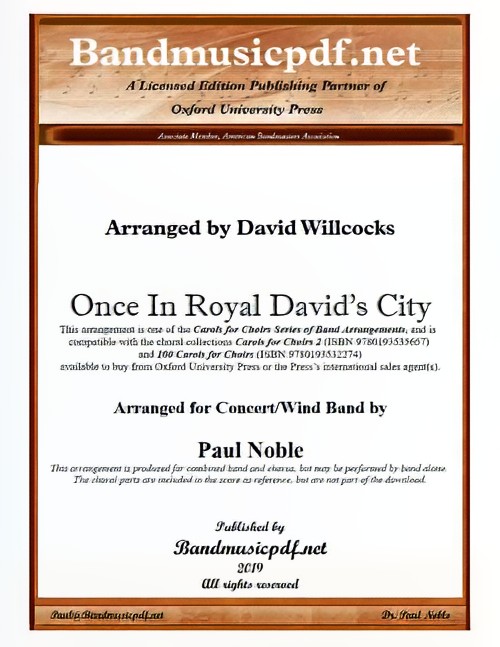Results
-
 £116.10
£116.10Here's to you (from the Movie: Sacco e Vanzetti) - Joan Baez
Estimated dispatch 7-14 working days
-
 £116.10
£116.10E.T. - John Williams
Estimated dispatch 7-14 working days
-
£89.99
Choral Prelude In E Minor - Alfred Reed
Estimated dispatch 7-14 working days
-
 £367.99
£367.99Adventures on Earth ( from E.T. ) - John Williams
Dynamic suite for concert band from the landmark Steven Spielberg classic film! Performance time - ca. 10:00
Estimated dispatch 7-14 working days
-
 £116.40
£116.40 -
 £120.40
£120.40Xenon - Filippo Ledda
Elemento chimico della Tavola Periodica degli Elementi, lo Xenon fa parte del gruppo dei Gas Nobili. incolore, inodore e decisamente pi pesante dell'aria. In un tubo riempito di gas, emette una luce molto intensa quando eccitato con una scarica elettrica, per cui viene utilizzato per la realizzazione di lampade e dispositivi luminosi. Il brano, diviso in sette sezioni che si susseguono senza soluzione di continuit, descrive un viaggio immaginario che percorre diametralmente l'interno di un atomo di xenon. La prima sezione (On the Edge of Nowhere), partendo dal presupposto che l'atomo una struttura al 99,9% vuota, descrive una realt non solo impercepibile dall'occhio umano ma anche non facilmente razionalizzabile, cos la sottile linea che separa il "nulla" dalla materia visibile rappresentata da un assolo di sax contralto. La seconda e la sesta sezione (Electrons) descrivono la nuvola di elettroni che turbina vorticosamente attorno al nucleo dell'atomo. I temi musicali qui si rincorrono e si scontrano; la ritmica delle percussioni, perlopi metalliche, simula questo moto perpetuo. La terza e la quinta sezione (Luminescence) descrivono la zona di quiete tra gli elettroni e il nucleo. Tutto avvolto da una luce bianca, simile a quella del sole; un momento di stasi, ma solo apparente: la calma durer poco. La sezione centrale (Core) il nucleo del brano. La parte pi interna dell'atomo anche la pi densa: percussioni martellanti, riff solidi, armonie sature, vogliono rappresentare la sua natura stabile e dinamica al tempo stesso. Infine, l'ultima sezione (On the Edge of Everything) rappresenta la conclusione del viaggio: l'uscita al di fuori dall'atomo di xenon con la consapevolezza, stavolta, che la materia visibile soltanto la miliardesima parte della realt, tutto il resto energia. L'assolo di sax, che riappare nelle ultime battute del brano, assume ora un diverso significato: cos' "nulla" e cos' "tutto"? La fine di questo viaggio immaginario, veramente una fine? Xenon la terza composizione della serie che l'autore sta dedicando ai Gas Nobili.
Estimated dispatch 7-14 working days
-
 £57.50
£57.50Theme From Family Guy - Murphy
From the wildly popular animated TV series Family Guy comes this swinging and thoroughly enjoyable theme. Solidly scored in the style of a Las Vegas show band, this is sure to be a hit with all audiences.InstrumentationTrombone 1 (x3)Trombone 2 (x3)Baritone - Bass Clef (x2)Baritone Treble Clef (x2)Tube (x4)Double Bass (x1)Percussion (x2)Timpani (x1)Mallet Percussion (x2)Piccolo (x1)Flute (x8)Oboe (x2)Bassoon (x2)B Flat Clarinet 1 (x4)B Flat Clarinet 2 (x4)B Flat Clarinet 3(x4)E Flat Alto Clarinet (x1)B Flat Bass Clarinet (x2)E Flat Alto Saxophone 1 (x2)E Flat Alto Saxophone 2 (x2)B Flat Tenor Saxophone (x2)E Flat Baritone Saxophone (x1)B Flat Trumpet 1 (x3)B Flat Trumpet 2 (x3)B Flat Trumpet 3 (x3)French Horn 1 (x2)French Horn 2 (x2)
Estimated dispatch 7-14 working days
-
 £98.20
£98.20Miniature Suite - Donald Furlano
Questo brano stato scritto in occasione del 150mo anniversario di fondazione del Corpo Musicale di Settimo Torinese. Se vogliamo fare un paragone con l'arte pittorica, si tratta di un trittico, cio l'insieme di tre distinti quadri, ciascuno dei quali rappresenta un aspetto significativo della citt di Settimo Torinese. Il primo quadro, che si rif ad alcune formule stilistiche della "marcia", rappresenta la Banda, che da 150 anni simbolo ed espressione "sonora" della comunit. Il secondo quadro, di carattere pi intimistico, rapprenta la Chiesa e si ispira allo stile del "corale", pur non avendone la canonica forma. Il terzo ed ultimo quadro rappresenta invece la Torre e quindi, non solo le istituzioni che governano la citt, ma anche i cittadini che vivono all'ombra di essa: da qui il tema popolare e lo stile di "danza" che lo caratterizza.
Estimated dispatch 7-14 working days
-
 £95.99
£95.995 Tantum Ergo (Concert Band - Score and Parts) - Bruckner, Anton - Doss, Thomas
Anton Bruckner (b. 4.9.1824, Ansfelden, d. 11.10.1896, Vienna) didn't have it easy. Throughout his life, the Austrian composer was plagued by self-doubt. Anton Bruckner came from a simple, rural background. After the death of his father, he was accepted as a choirboy at the monastery of Sankt Florian in 1837. After several years as a school assistant and his own organ and piano studies, he first worked as organist in St. Florian, then from 1855 as cathedral organist in Linz. Introduced to music theory and instrumentation by Simon Sechter and Otto Kitzler, he discovered Richard Wagner as an artistic role model, whom he admired throughout his life and also visited several times in Bayreuth. In 1868 Anton Bruckner became professor of basso continuo, counterpoint and organ at the Vienna Conservatory; ten years later court organist; and in 1891 finally honorary doctor of the University of Vienna. He was considered an important organ virtuoso of his era, but had to wait a long time for recognition as a composer. It was not until Symphony No.7 in E major, composed between 1881 and 1883, with the famous Adagio written under the effects of Wagner's death, that he achieved the recognition he had hoped for, even if he was reluctant to accept it given his inclination towards scepticism and self-criticism. Anton Bruckner was a loner who did not want to follow a particular school or doctrine. He composed numerous sacred vocal works, such as his three masses, the Missa Solemnis in B flat minor (1854), the Te Deum (1881-84) and numerous motets. As a symphonic composer, he wrote a total of nine symphonies and many symphonic studies from 1863 onwards, tending to revise completed versions several times over. Bruckner's orchestral works were long considered unplayable, but in fact were merely exceptionally bold for the tonal language of their time, uniting traditions from Beethoven through Wagner to folk music, on the threshold between late Romanticism and Modernism. Hymns for four-part mixed choir a cappella (1846, St. Florian) No. 1 in E flat major (WAB 41/3): Quite Slow No. 2 in C major (WAB 41/4): Andante No. 3 in B flat major (WAB 41/1): Slow No. 4 in A flat major (WAB 41/2): Slow Hymn for five-part (SSATB) mixed choir and organ No. 5 in D major: Solemnly They are simple works, completely subordinate to their liturgical use, which nevertheless already show numerous characteristics of personal expression. These small pieces were able to stand up to the harsh scrutiny of the mature master: in 1888, Bruckner subjected them to a revision in which he made only minor corrections.Duration: 11.00
Estimated dispatch 7-14 working days
-
 £75.00
£75.00Once in Royal David's City (Concert Band with Optional Choir - Score and Parts) - Noble & Willcocks
Once in Royal David's City is a Christmas carol originally written as a poem by Cecil Frances Alexander. The carol was first published in 1848 in her hymnbook Hymns for Little Children. A year later, the English organist Henry John Gauntlett discovered the poem and set it to music. According to The New Oxford Book of Carols, the text was conceived by Cecil Alexander after overhearing a group of her god children complaining about the dreariness of the catechism. Cecil masterfully took doctrines from the Apostle's Creed and simplified them for her hymns. Cecil wrote about 400 hymns in her lifetime, among which are All things bright and beautiful and There Is a Green Hill Far Away. She used the money for charitable purposes, and was a tireless advocate (and visitor) of the poor and sick. Henry John Gauntlett had spent the first half of his career as a lawyer before abandoning his practice to pursue music. He served as the organist at a number of leading London churches. Gauntlett was a prolific writer and is said to have composed over 1000 hymn tunes. He made tremendous contributions to the world of music, even inventing mechanical improvements to the organ. As a result, he was praised by the famous Felix Mendelssohn and was awarded an honorary doctorate in music from the Archbishop of Canterbury. In 1919, Arthur Henry Mann, organist at King's College (1876-1929), introduced an arrangement of Once in Royal David's City as the processional hymn for the service. In his version, the first stanza is sung unaccompanied by a boy chorister. The choir and then the congregation join in with the organ on succeeding stanzas. This has been the tradition ever since. It is a great honor to be the boy chosen to sing the opening solo--a voice heard literally around the world. In this arrangement for band accompaniment, the first five verses may be performed as directed by the conductor, with different groupings of instruments for each verse, i.e., Vs.1, A cappella; Vs. 2, Fl., Oboe, E.H., Bsns; Vs. 3 Cl., Saxes; Vs. 4, Brass; Vs. 5, All, and Vs. 6 as written with featured descant. This arrangement is one of the Series of Band Arrangements compatible with the David Willcocks Carols for Choir, Book 2 (#31).
Estimated dispatch 7-14 working days
